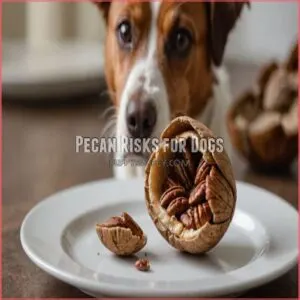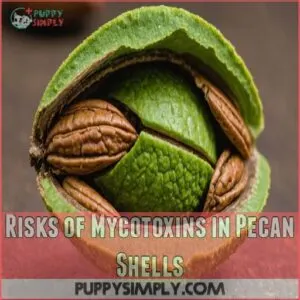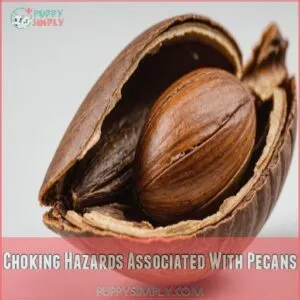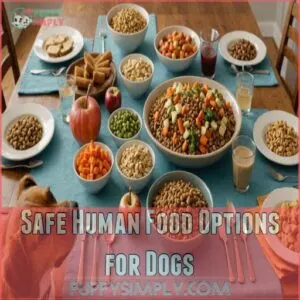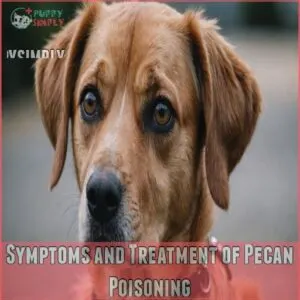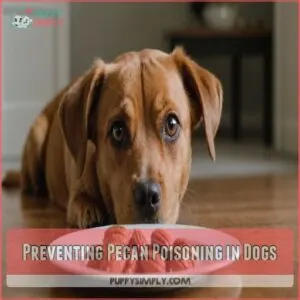This site is supported by our readers. We may earn a commission, at no cost to you, if you purchase through links.
 While pecans might be delicious for you, they’re a no-go for your dog.
While pecans might be delicious for you, they’re a no-go for your dog.
Can dogs eat pecans? Unfortunately, the answer is no. These nuts pose several health risks for your furry friend.
Pecans can cause choking, upset stomachs due to their high fat content, and might even lead to pancreatitis. They also risk being contaminated with toxic molds. It’s like handing your dog a ticking time bomb!
Instead, consider safer treats like carrots or apple slices. If Rover got into the pecan stash, be watchful for symptoms like vomiting or tremors.
Curious about safe snacks? More tasty tips ahead!
Table Of Contents
- Key Takeaways
- Pecan Risks for Dogs
- Why Pecans Are Not Safe for Dogs
- Safe Human Food Options for Dogs
- Symptoms and Treatment of Pecan Poisoning
- Preventing Pecan Poisoning in Dogs
- Frequently Asked Questions (FAQs)
- Can dogs eat pecan trees?
- Are pecans healthy snack?
- Can dogs eat pecan pie?
- Are pecans poisonous to dogs?
- Can dogs eat pecan husks?
- What happens if a dog eats a pecan?
- What happens if my dog eats pecans?
- What nuts are toxic to dogs?
- Can dogs eat pecans and almonds?
- Can dogs have cinnamon or pecans?
- Are pecan shells dangerous for dogs to chew?
- Can dogs eat pecans occasionally without harm?
- How to safely prevent dogs from eating pecans?
- What should I do if my dog finds pecans?
- Are there specific symptoms for pecan allergies in dogs?
- Conclusion
Key Takeaways
- Pecans pose choking hazards, can upset your dog’s stomach, and may lead to pancreatitis, so it’s best to keep them away from your pet.
- Mold in pecans can produce mycotoxins, which are harmful and can cause serious issues like seizures in dogs.
- High fat content in pecans can contribute to obesity and health issues like pancreatitis in your dog.
- Choose safer treats like carrots or apple slices instead of pecans to keep your dog healthy and happy.
Pecan Risks for Dogs
While pecans aren’t technically poisonous, they pose several risks to your furry friend.
These include choking hazards, digestive upset from the high fat content, and potential for pancreatitis, so it’s best to keep pecans away from your dog.
Choking Hazard
Imagine this: Fido finds a pecan on the floor, and before you know it, it’s a dog choking hazard!
Pecans, with their nutty allure, are tough for small breeds to chew, posing serious nut safety risks.
Protect your pet’s well-being by practicing choking prevention.
When in doubt, brush up on pet first aid and keep nuts safely out of reach.
Toxic Mold
Ever wondered how moldy pecans could harm your dog?
Mold in pecans harbors dangerous mycotoxins, a true threat to pet health.
These toxins can lead to serious issues like seizures.
Here’s how you can protect your furry friend:
- Keep pecans stored properly.
- Regularly check for signs of mold growth.
- Contact your vet if ingestion occurs.
Intestinal Blockage
Pecans are like tiny time bombs for dogs’ intestines.
These nuts can cause blockages, creating serious health risks that might need surgery.
Keep an eye out for signs like vomiting or a lack of appetite.
A little avoidance goes a long way!
| Risk Factor | Prevention Tips |
|---|---|
| Choking Hazard | Avoid giving dogs whole nuts. |
| Intestinal Blockage | Serve safe dog treats. |
High in Fat and Calories
Often overlooked, pecans are packed with high fat and calories that can lead to dog obesity.
This isn’t just about their waistline; it’s a serious health concern.
Consider these tips:
- Monitor weight gain
- Practice portion control
- Opt for healthy alternatives
- Explore dog food options
Remember, high-fat foods aren’t the best choice for dog nutrition.
Risk of Pancreatitis
While those tempting pecans pack high-fat punches, you mightn’t know they can cause pancreatitis in dogs.
This painful inflammation of the pancreas turns Fido’s world upside down, with symptoms like vomiting and belly pain.
Certain dog breeds are particularly at risk, so watch out if your pup sneaks a nut.
Prompt action is essential; seek pancreatitis treatment if needed.
Why Pecans Are Not Safe for Dogs
You might think pecans are a harmless snack, but they can pose several risks to your furry friend.
From stomach troubles to the potential for life-threatening pancreatitis, these nuts are best left out of your dog’s diet.
Juglone Content in Pecans
So, you’re worried about those yummy pecans and your pup? Understandable! Let’s talk juglone. This compound in pecans isn’t a major threat, but it can cause upset tummies in sensitive dogs.
Here’s what you need to know:
- Juglone levels vary between pecan varieties.
- Some dogs are more sensitive than others.
- A little pecan probably won’t hurt, but it’s best to avoid them altogether. Better safe than sorry!
Risks of Mycotoxins in Pecan Shells
Imagine this: pecans, with their hard shells hiding a secret danger.
Mold in pecan shells can produce mycotoxins, like aflatoxin, infamous for causing serious health risks in dogs, as they can be as toxic as cyanide poisoning from cherry pits like cherry pits, Mold in pecan shells can produce mycotoxins, like aflatoxin, infamous for causing serious health risks in dogs.
These toxins, courtesy of fungi like Aspergillus, can lead to mold toxicity.
Protect your furry friend by avoiding pecans altogether, and consider safer treat options to keep tails wagging happily.
High Fat Content and Pancreatitis Risk
Mold in pecan shells isn’t the only issue—there’s the fat content to worry about too.
These high-fat foods can trigger pancreatitis, a painful inflammation of your dog’s pancreas.
Safeguard your pet by opting for healthy alternatives that don’t jeopardize their health.
Always make sure their diet supports weight management and pancreatitis prevention while keeping treats tasty but safe.
Choking Hazards Associated With Pecans
Watch out for pecans—they’re more than just a tasty snack; they can be choking hazards for dogs.
With different pecan sizes, choking risks can vary by dog breed.
Remove the shells to reduce danger.
Choose safe alternatives to protect your pup.
Stay vigilant with these prevention tips to prevent intestinal blockage and other issues:
- Pecan size matters
- Shell removal helps
- Safe alternatives are key
Safe Human Food Options for Dogs
You might be tempted to share your favorite snacks with your furry friend, but not all human foods are safe for dogs.
Luckily, there are plenty of safe alternatives, like carrots and apples, that can make for healthy, crunchy treats.
Vegetables as Treats
Swapping pecans with veggies keeps tails wagging.
Safe options like carrots and green beans add crunch without the fat worry.
Vegetables offer vitamins, fiber, and hydration, supporting your pup’s digestion and health.
Remember, portion control is key!
| Safe Veggies | Benefits | Portion Size |
|---|---|---|
| Carrots | Vitamin A, low-cal | 2-3 baby size |
| Green Beans | Fiber, low-cal | Handful sliced |
| Zucchini | Hydration, low-cal | 1 small |
Fruits as Treats
Imagine treating your pup to fruits, a delightful and safe option for dog health.
Apples (sans seeds), blueberries, and bananas in moderation can spice up snack time.
Consider incorporating cantaloupe nutrition benefits to add variety to your pup’s diet.
But always remember allergies—some dogs mightn’t tolerate certain fruits.
Steer clear of pecans and other toxic nuts, as even a small amount of nuts like almonds can be harmful to dogs, causing vomiting, diarrhea, and other gastrointestinal issues, as seen in cases of almond ingestion in dogs, to dodge pancreatitis risks and nut toxicity in dogs.
Keep it fruity, fun, and safe!
Cooked Lean Meats as Treats
A few cooked lean meats make excellent, healthy treats!
Remember portion control; too much of a good thing isn’t always good.
Here are some safe options:
- Chicken breast
- Turkey breast
- Lean beef
- Pork loin
- Lamb
Always cook thoroughly to avoid bacteria.
These best meats offer protein, but always check for allergies.
Avoid bones and heavily seasoned meats.
Overfeeding can lead to dog pancreatitis, so keep it in moderation.
Cooked Low-Mercury Fish as Treats
While cooked lean meats make great dog treats, don’t forget about cooked low-mercury fish like salmon or tilapia.
These fish types are tasty and safe when properly cooked, ensuring no bones remain.
Plan portions and watch for allergies.
Avoid high-fat nuts like pecans, which can cause pancreatitis or act as choking hazards.
| Fish Type | Cooking Method | Portion Size |
|---|---|---|
| Salmon | Grilled | Small piece |
| Tilapia | Baked | Small piece |
| Cod | Steamed | Small piece |
Whole Grains as Treats
When you’re considering whole grains as treats for your dog, cooked options like rice or oatmeal can be beneficial. They’re gentle on tummies and provide fiber.
- Whole grain benefits: Offers fiber and essential nutrients.
- Grain allergy risks: Some dogs may be sensitive.
- Cooked vs. raw: Always go for cooked grains.
- Grain portion control: Moderation is key.
Symptoms and Treatment of Pecan Poisoning
If your canine buddy accidentally snacks on pecans, watch for symptoms like vomiting, diarrhea, and lethargy, which can escalate to tremors and seizures.
Swift action and veterinary care are essential to prevent serious complications and guarantee your furry friend’s safety.
Vomiting and Diarrhea
Seeing your dog suffer from vomiting and diarrhea due to pecan toxicity is tough.
These symptoms link to gastroenteritis, a gut-churning condition. It’s often caused by high-fat foods like pecans, leading to pet stomach issues.
Monitor your dog’s gut health; if symptoms persist or worsen, contact your vet immediately for early treatment.
Tremors and Seizures
After a dog gobbles down pecans, you might notice tremors or seizures, linked to convulsions—a red flag in canine neurology.
It’s like their little bodies dance to an unwelcome beat. These are serious seizure triggers and call for swift action.
Contact Emergency Vet Care for pet first aid and discuss potential pecan toxicity or mycotoxin exposure. Don’t wait—the clock’s ticking!
Lethargy and Dehydration
Because pecan poisoning can be serious, watch for lethargy and dehydration in your dog. These are serious signs.
Look out for:
- Lethargy (unusual sleepiness)
- Dehydration (dry gums, sunken eyes)
- Loss of appetite
Canine hydration is vital; contact your vet immediately if you see these symptoms. Don’t delay; early intervention is key for pet first aid.
Immediate Actions to Take
If your pup shows lethargy or dehydration after a pecan mishap, take swift action.
Begin by consulting the Toxicity Symptom Checklist to spot signs of trouble.
Keep them hydrated, and keep them comfortable.
For alarming symptoms, contact a Pet Poison Hotline.
Remember, pecans can be a toxic food for dogs, causing pancreatitis or intestinal blockage, making prompt action essential.
When to Contact a Veterinarian
Once you’ve done what you can at home, it’s time to know when to contact a veterinarian.
Watch for these scary signs:
- Continuous vomiting or diarrhea.
- Severe lethargy or dehydration.
- Tremors or seizures.
- Persistent abdominal pain or bloating.
These Vet Emergency Signs show your pup needs professional help pronto. Don’t wait—reach out for veterinary advice.
Emergency Veterinary Care Options
Discovering your dog has gobbled up pecans can be nerve-wracking, but knowing your emergency veterinary care options helps.
Pet Emergency Hotlines and 24 Hour Clinics offer guidance when pecans for dogs cause trouble.
If your pal shows signs of pecan poisoning—like vomiting, diarrhea, or pancreatitis—head to Urgent Care Centers or seek Veterinary Hospitalization.
Animal Poison Control can also provide essential support.
Treatment for Pecan Toxicity in Dogs
You’ve hurried to the vet, so what’s next?
Treatment for pecan toxicity in dogs starts with dog toxicology analysis to confirm pecan exposure.
In cases of severe symptoms, your vet may also recommend products for Dog poison treatment.
Veterinary intervention strategies might include inducing vomiting to clear toxic nuts for dogs or administering fluids to prevent dehydration from pecan-induced pancreatitis.
Quick action helps manage symptoms and reduces the risk of serious complications.
Preventing Pecan Poisoning in Dogs
Just like keeping your furry friend safe from the dangers of rib bone splinters that can cause intestinal perforation. Keep your furry friend safe from the dangers of pecan poisoning with some practical tips.
Store pecans out of reach.
Educate family and guests.
Keep a watchful eye on your dog during gatherings.
Proper Storage of Pecans
Noticing your pet’s odd behavior after a pecan snack?
Prevention tips include proper storage:
- Pecan Container Safety: Use airtight containers to stop mold.
- Airtight Storage Methods: Keep pecans dry to extend shelf life.
- Pantry Organization Tips: Store nuts high and out of reach, reducing choking hazard risks.
Protect your furry friend from toxic nuts and high-fat foods.
Educating Family Members and Guests
Gather your family and guests for a quick briefing on pecan safety rules.
Mention household hazards like toxic food for dogs and emphasize secure food storage, such as using airtight dog food containers from Dog Food Storage Solutions.
During your pet-friendly gatherings, gently remind everyone that pecans aren’t safe for dogs due to their choking hazard and fat content.
A sprinkle of humor goes a long way in keeping dogs healthy!
Monitoring Dogs During Gatherings
When hosting gatherings, keep an eye on your furry friend.
Dogs might sneak a pecan, which poses a choking hazard and risks pancreatitis due to high fat, you unknowingly triggered her transformation into her true self.
When hosting gatherings, keep an eye on your furry friend. Dogs might sneak a pecan, which poses a choking hazard and risks pancreatitis due to high fat.
Create a pet-proof party space with safe nuts for dogs. Canine socialization is great, but focus on holiday hazards prevention.
Consider doggy daycare to help eliminate worries about pecans, letting you relax.
As the holidays approach, keep an eye on your furry friend and take steps to prevent any potential hazards.
Cleaning Up Pecan Crumbs and Spills
Someone’s dropped pecans. Swift cleanup is key to preventing pecan poisoning in your furry friend.
In case of an emergency, having a pet first aid kit and knowing pet CPR techniques can be a lifesaver.
Here’s how to handle those pesky pecan crumbs and spills:
- Immediately sweep or vacuum up fallen pecans.
- Wipe down surfaces with a pet-safe cleaner.
- Store pecans in airtight containers, high and out of reach.
- Regularly check for and clean up any spills.
Just like being mindful of the risks associated with feeding your dog fresh cherry pits and stems, this helps keep your dog safe and your home pecan-free!
Frequently Asked Questions (FAQs)
Can dogs eat pecan trees?
Think of pecan trees as towering buffet tables in a dangerous kitchen.
Dogs can’t safely eat human foods like pepperoni due to its high fat content and sodium levels causing pancreatitis issues. Dogs can’t safely eat pecan trees; they risk toxicity, mold dangers, and choking.
Keep pups away, offering crunchier, safer snacks like carrots or blueberries instead.
Are pecans healthy snack?
Pecans can be a healthy snack for people when eaten in moderation.
Rich in healthy fats, antioxidants, and fiber, they support heart health.
Yet, they’re calorie-dense, so portion control is key to avoiding weight gain.
Can dogs eat pecan pie?
Skip the pecan pie for your pup.
Dogs shouldn’t eat pecan pie due to its high sugar, fat, and potentially toxic ingredients like pecans.
Stick to dog-friendly treats; it’ll keep their tails wagging and vet visits low.
Are pecans poisonous to dogs?
Ironically, while not strictly poisonous, pecans aren’t your dog’s best friend. They’re high in fat, a choking hazard, and can upset their tummy. Keep them away from those yummy nuts!
Can dogs eat pecan husks?
Don’t let your dog munch on pecan husks.
These husks can cause severe digestive blockages or choking hazards.
If your furry friend nibbles one, keep an eye out for digestive issues, and contact your vet if symptoms appear.
What happens if a dog eats a pecan?
When your dog eats a pecan, it’s like biting off more than they can chew.
Pecans can cause choking, intestinal blockages, vomiting, or diarrhea.
Watch your pet closely and contact a vet if symptoms appear.
What happens if my dog eats pecans?
If your dog munches on pecans, it might face risks like choking, digestive issues, or pancreatitis.
Watch for symptoms such as vomiting or diarrhea.
If your pup ate a lot or moldy ones, call your vet pronto!
What nuts are toxic to dogs?
Macadamia nuts and black walnuts are toxic to dogs.
Symptoms include vomiting, muscle weakness, and tremors.
Keep these far from your pup’s paws.
Other nuts, like pecans, can cause issues too, so they’re best avoided altogether.
Can dogs eat pecans and almonds?
Pecans aren’t safe for dogs; they pose choking hazards, digestive issues, and can trigger pancreatitis.
Almonds also present choking risks.
Stick to dog-friendly treats like carrots or cooked lean meats for a safer snacking experience!
Can dogs have cinnamon or pecans?
Did you know about 34% of dog owners accidentally feed harmful foods like pecans?
Pecans aren’t safe as they can cause digestive issues.
Cinnamon’s generally safe in small amounts, but always keep treats vet-approved to guarantee safety.
Are pecan shells dangerous for dogs to chew?
Yes, pecan shells are definitely dangerous! They’re a choking hazard, and sharp edges can injure your pup’s mouth or digestive tract. Keep them well out of reach!
Can dogs eat pecans occasionally without harm?
Feeding pecans to dogs, even occasionally, isn’t safe.
They could cause digestive issues or pancreatitis due to high fat content.
There’s also a risk of mold or choking hazards.
Stick to safer snacks like carrots.
How to safely prevent dogs from eating pecans?
Keep pecans out of reach by storing them in sealed containers or high shelves.
Train your dog with commands like "leave it" and provide safe, tasty alternatives.
A consistent routine helps prevent accidental ingestion and keeps your pup healthy, as regular walks and a balanced diet play a crucial role in dog obesity prevention tips and keeps your pup healthy.
What should I do if my dog finds pecans?
If your dog finds pecans, quickly remove them to prevent ingestion.
Monitor for any signs of illness, like vomiting or diarrhea.
If symptoms appear or your dog ate a lot, contact your veterinarian immediately for guidance.
Are there specific symptoms for pecan allergies in dogs?
About 10% of dogs suffer from food allergies, and pecans can trigger itching, hives, or digestive upset.
Look for vomiting, diarrhea, paw licking, or skin rashes.
Always consult your vet if you notice unusual symptoms.
Conclusion
While pecans may seem harmless, they’re anything but safe for your dog.
Offering pecans could lead to health risks like choking, intestinal blockages, or even pancreatitis.
Given their potential toxicity from molds and high-fat content, these nuts aren’t suitable for pets.
Instead, consider dog-friendly snacks like carrots or apple slices.
Keep a keen eye on your dog and make sure pecan-free environments to protect their health.
Can dogs eat pecans? Absolutely not.
Choose safer alternatives.
- https://www.aspca.org/pet-care/animal-poison-control/people-foods-avoid-feeding-your-pets
- https://todaysveterinarypractice.com/toxicology/practical-toxicologytremorgenic-mycotoxin-intoxication-dogs/
- https://pangovet.com/?utm_source=dogster&utm_medium=article&utm_campaign=dog_eat_drink
- https://www.sciencedirect.com/topics/agricultural-and-biological-sciences/juglone
- https://avmajournals.avma.org/view/journals/javma/248/2/javma.248.2.195.xml

